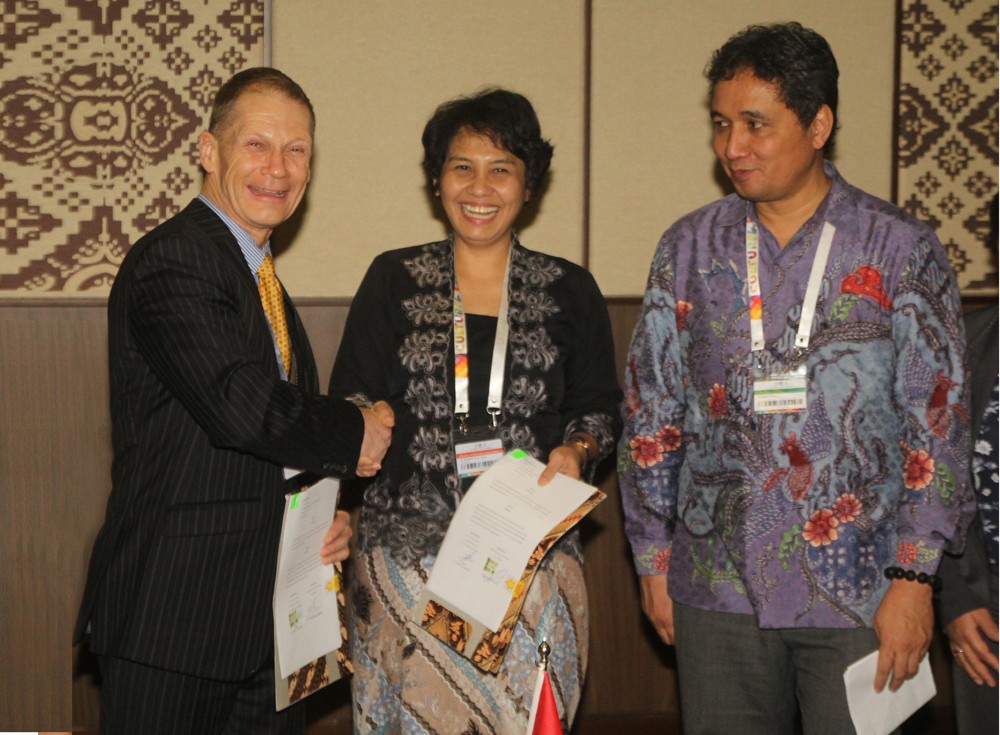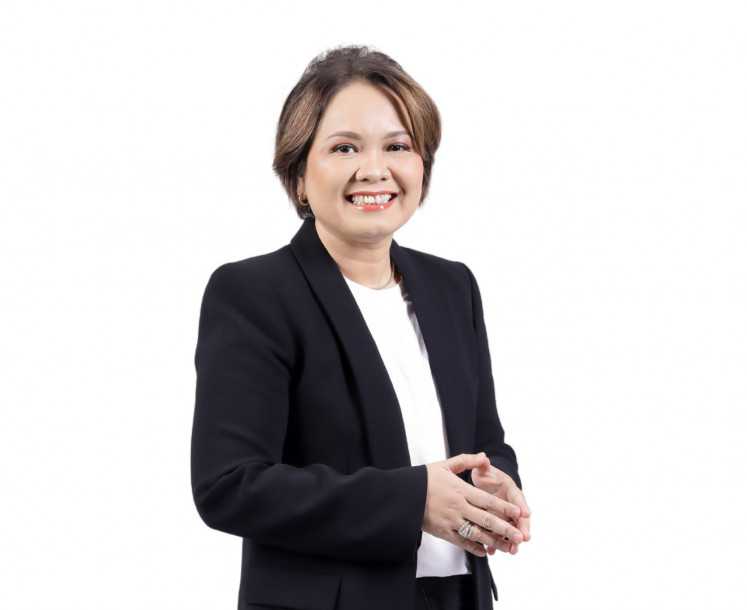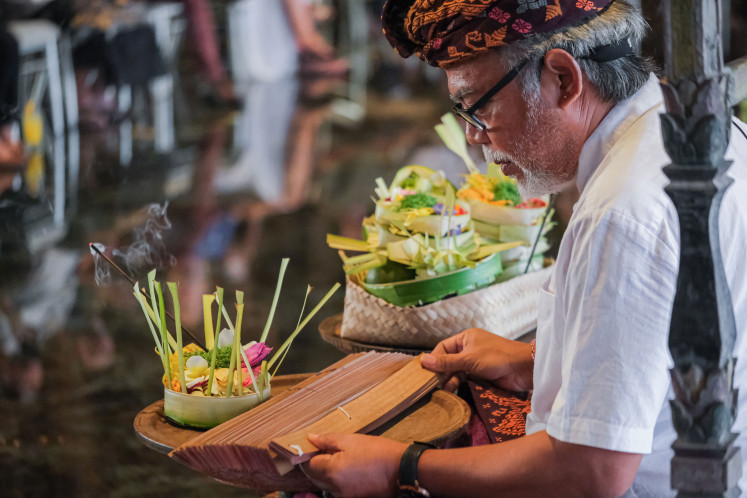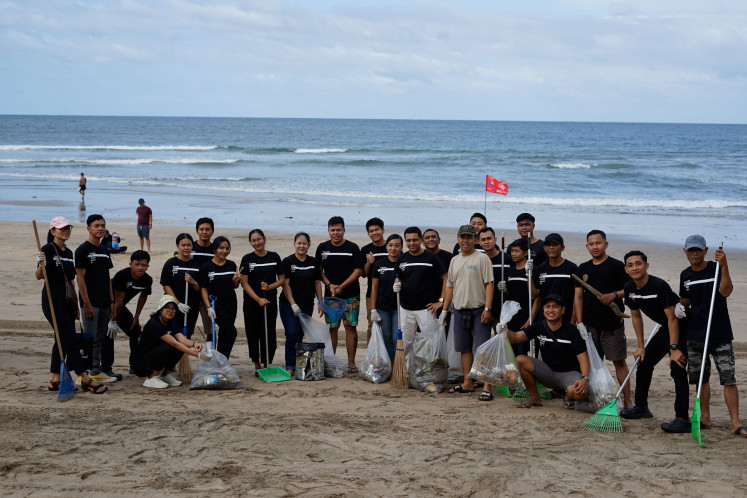Promoting, preserving arts and culture: Doing it the digital way
Change Size
 Auckland University of Technology pro vice-chancellor international and school of culture and society dean Nigel Hemmington (left to right), Indonesia’s Culture and Education Ministry planning and international cooperation bureau head Suharti and the ministry’s director general of culture Hilmar Farid pose for a picture after the signing of a memorandum of understanding pertaining to both parties’ cooperation in a capacity building program for 50 Indonesian cultural workers in New Zealand. (JP/Zul Trio Anggono)
Auckland University of Technology pro vice-chancellor international and school of culture and society dean Nigel Hemmington (left to right), Indonesia’s Culture and Education Ministry planning and international cooperation bureau head Suharti and the ministry’s director general of culture Hilmar Farid pose for a picture after the signing of a memorandum of understanding pertaining to both parties’ cooperation in a capacity building program for 50 Indonesian cultural workers in New Zealand. (JP/Zul Trio Anggono)
A
lthough digital technology has its share of downsides, particularly for younger generations, including shortened attention spans and increased egocentrism, it is a powerful tool to promote and preserve arts and culture, keeping strings connected among generations.
That is a short summary of the Culture in the New Digital World symposium conducted on Oct. 12 at the Bali Nusa Dua convention center as part of the World Culture Forum 2016, co-organized by the Culture and Education Ministry and the United Nations Educational, Scientific and Cultural Organization (UNESCO).
The four-day international gathering was aimed at advancing culture as an integral part of sustainable development while building a harmonious “global-local” society featuring cultural performances as well as discussion sessions as platforms to exchange ideas and field experiences that will translate into a series of recommendations for UNESCO members.
During the session, Google Cultural Institute (GCI) operations head Luisella Mazza as well as arts and culture Europana Foundation executive director Jill Cousins shared their experiences in disseminating the arts through digital technology.
GCI’s Google Arts and Culture (artsandculture.google.com), for example, has endeavored to break physical barriers between the public and the arts by providing 360-degree virtual tours of museums all over the world, including the Bruegel box in Brussels, since it was launched in 2011. The website has also undertaken an ambitious task of making people feel as if they are onstage with world-class performers despite viewing them only through a computer or tablet.
Meanwhile, the Europeana Foundation (europana.eu) sources data from cultural organizations and research libraries to digitize information pertaining to artworks in multimedia format.
“We don’t just feature individual materials but also connections among different things. If you, for instance, type ‘Mozart’ in the search box, you will find not just recordings of his music, but also paintings of his figure,” Jill told the forum. She added that the information could also be useful for the creative industry, art researchers as well as other related stakeholders.
Jill said in order to attract younger audiences to the digital project, Europana used platforms familiar to youngsters like Wikipedia, Google and Instagram. She also attempted to make the artworks as fun and engaging as possible to cater to the penchant of Generation Z — a popular term referring to the digital generation — for intense personal participation.
For instance, this year they set up an art installation called Jumping Jacks, where participants saw their bodies projected onto a wall but transformed with cutouts from significant artworks (the right arm of a figure from a Caravaggio masterpiece, for instance) and were asked to follow the movements of the cutout figures.
“We collaborate with curators, cultural organizations and tech product managers to develop our platform,” Luisella explained.
Transnational knowledge transfer
True to the emphasized importance of collaboration and participation among the digital generation, the Education and Culture Ministry has signed a memorandum of understanding (MoU) with New Zealand’s Auckland University of Technology (AUT) pertaining to a month-long capacity building program involving 50 Indonesian cultural workers.
The cultural workers come from various backgrounds: dance, music, theater, film, galleries and museums, visual arts, history and philology, among others. The training itself will focus on the use of technology to conserve the arts as well as to disseminate them. A special emphasis will be placed on data archiving.
The first week of the program will commence in Indonesia while the subsequent three weeks will be conducted at the AUT campus. It will run from Nov. 13 to Dec. 4.
The MoU was signed by AUT pro vice-chancellor international and dean of school of culture and society Nigel Hemmington and the ministry’s planning and international cooperation bureau head Suharti on Oct. 12 on the sidelines of the World Culture Forum 2016.
“There’s a high demand for this program; around 900 people applied during the registration process,” the ministry’s director general of culture, Hilmar Farid, told the press.
Nigel said the university would transfer skills in protecting, maintaining and promoting culture, specifically New Zealand’s field experience and expertise in protecting the language and dance of its native Maori people through digital archiving.
Hilmar said that, upon returning to Indonesia, the 50 cultural workers would be stationed across the country to apply their knowledge in a local context, in a residential program that would be regularly monitored and evaluated to ensure sustainable change. He said in the future the ministry would like to cooperate with more countries on similar exchange programs.
A similar program for teachers will soon be conducted.
Nigel said New Zealand looked forward to working closely once again with Indonesia on educational programs. An investment of US$35 million has been confirmed to set up an Asia-Pacific center of excellence to facilitate the programs.









